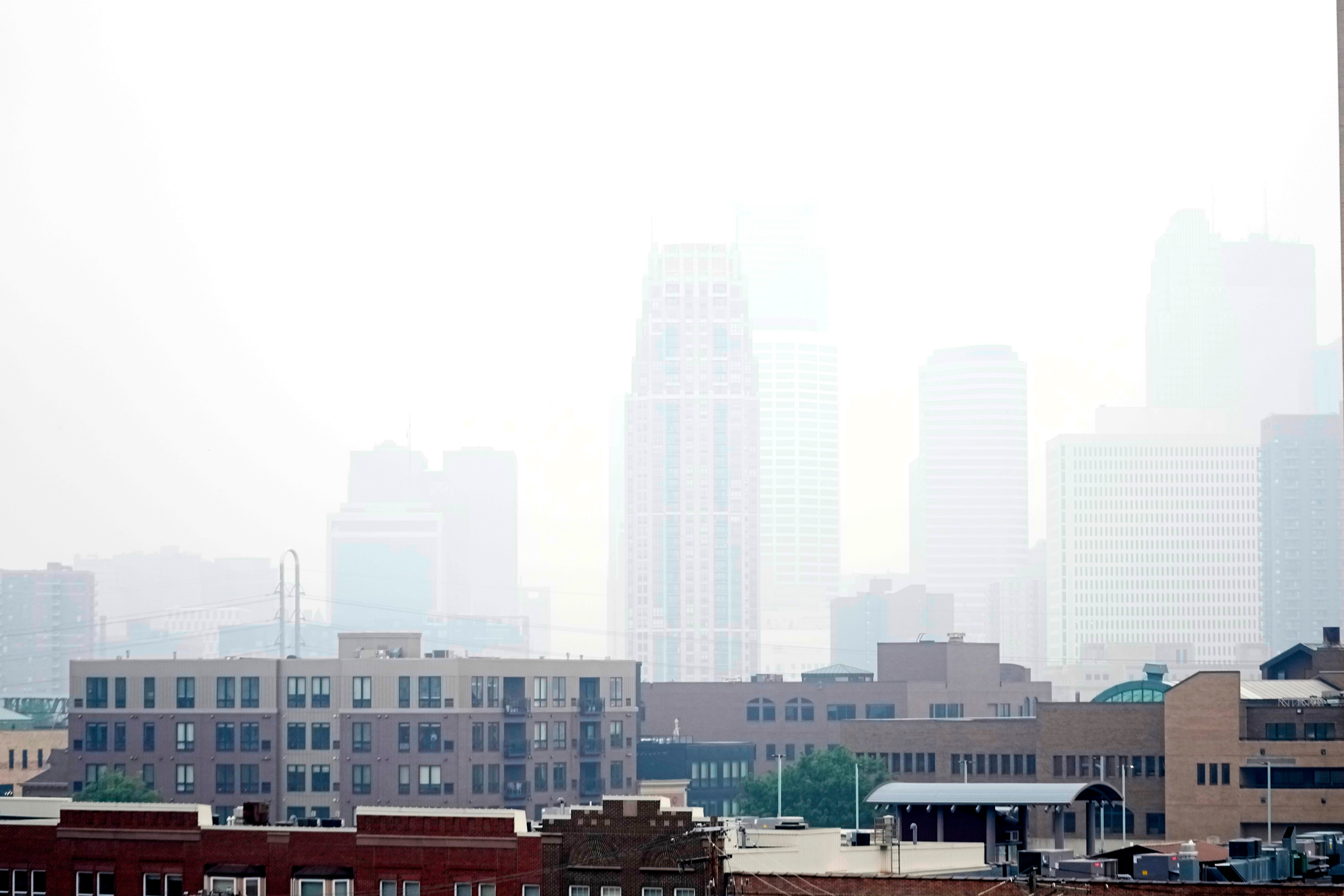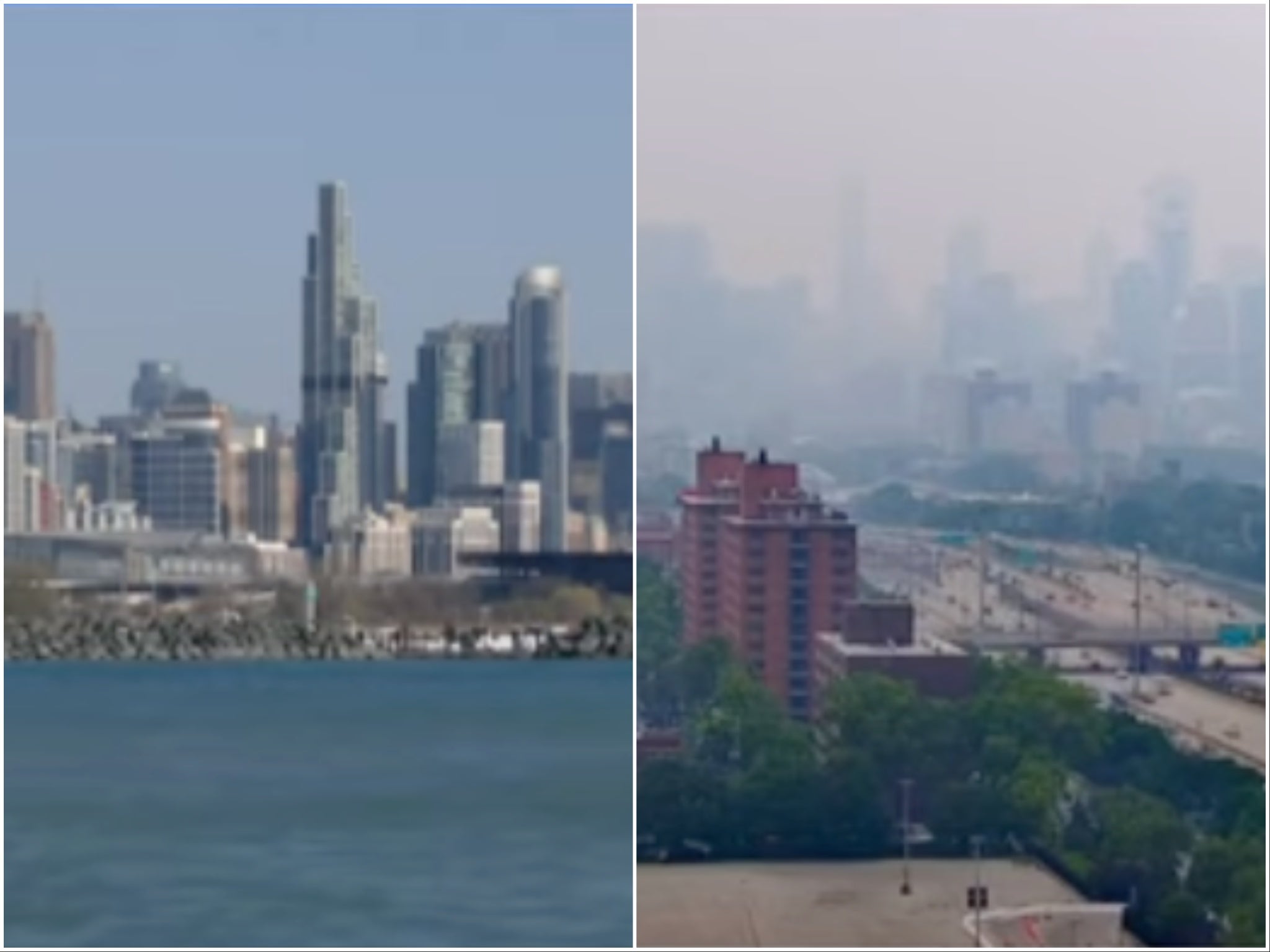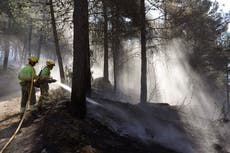Chicago air quality unhealthy as Canadian wildfire emissions reach record levels and send smoke to Europe
Increasing wildfire intensity in Canada leads to smoke travelling across North Atlantic and reaching Europe
The air quality in Chicago has reached unhealthy levels as the city is affected by the smoke coming from the wildfires in Canada, where record-beating emissions are leading to the smoke travelling all the way across the North Atlantic and reaching Europe.
The smoke is leading to hazy conditions in the Windy City on Tuesday, with the air quality now considered unhealthy for everyone, not just those with respiratory conditions.
AirNow.gov recommends that people with lung or heart disease, as well as the elderly, teenagers, and children, reduce their exposure to the air by avoiding laborious outdoor activities, limiting time spent outside by considering moving outdoor activities inside or rescheduling for another time when the air quality has improved.
For all people, including healthy adults, AirNow.gov urges people to choose easier outdoor activities, such as walking instead of running to avoid breathing hard and limiting time spent outdoors.
Global temperature rise, caused by emissions from burning fossil fuels, is leading to more large, erratic wildfires around the world. It’s a vicious circle – emissions pumped into the atmosphere by fires add to global heating, further drying out the land and vegetation, and making it more susceptible to catching fire.
The emissions from the Canadian wildfires are the highest on record, and the smoke has now reached Europe, according to the Copernicus Atmosphere Monitoring Service (CAMS), which is a part of the European Union’s space programme.

The wildfires have been affecting large parts of Canada since May. The emissions from the wildfires up until 26 June are the largest estimated annual emissions for Canada in more than two decades of monitoring by CAMS.
The smoke has degraded the air quality in North America and reached Europe during June’s second week. The fires started in Canada’s West in May before moving east and leading to about 160 megatonnes of carbon emissions.
It’s the highest annual total estimated emissions for Canada since monitoring started in 2003.
As last week came to an end, the fires in Quebec and Ontario intensified, leading the smoke to travel across the North Atlantic and reaching Europe with high levels of aerosol optical depth and carbon monoxide.

“It is important to note that long-range transport of smoke, such as this episode, tend to occur at higher altitudes where the atmospheric lifetime of air pollutants is longer,” CAMS said in a press release.
This means that the skies will be more hazy and the sunsets are often red or orange.
The higher altitude means that “the predicted smoke transport is not expected to have a significant impact on surface air quality,” CAMS adds.
Mark Parrington, a senior scientist at CAMS, said in a statement: “Our monitoring of the scale and persistence of the wildfire emissions across Canada since early May has shown how unusual it has been when compared to the two decades of our dataset.”
“The long-range transport of smoke that we are currently monitoring is not unusual, and not expected to have any significant impact on surface air quality in Europe, but it is a clear reflection of the intensity of the fires that such high values of aerosol optical depth and other pollutants associated with the plume are so high as it reaches this side of the Atlantic,” he added.
Dr Ravi Kalhan, the Northwestern Medicine deputy division chief of pulmonary and critical care medicine, said in a statement: “The people who are the most vulnerable are children and teens, older people, people with chronic lung diseases and people with heart conditions. When they are exposed to and inhale wildfire smoke, which is mostly made up of fine particles, those particles are tiny enough to get deep into the lungs and trigger an inflammatory response in the body, which can worsen chronic health conditions. People with asthma and chronic pulmonary obstructive disease and heart disease should certainly stay inside.”
“If people have air purifiers, turn them on. Keep the windows closed. If they have central air conditioning, they should run the fan and if possible, upgrade the filter to MERV13, which is efficient at capturing fine particles. Anyone who can tolerate them should consider wearing an N95 mask if they have to go outdoors to protect themselves from inhaling these particles,” he added.
“The EPA index of 20 is equivalent to smoking one cigarette a day,” Dr Kalhan said about the possible long-term effects. “Today, the air quality index in Chicago has been approaching 200. That’s like smoking a half-a-pack of cigarettes a day. It’s not news that smoking is bad for you, and this similar fine particulate matter has all the effects of inhaling noxious dusts and chemicals.”
“If people are consistently exposed to these things, it can cause long-term risks for heart and lung diseases. Luckily, these high-intensity exposures have usually only lasted a few days, but with climate change and increasing exposure to wildfire smoke on a sustained basis, it does create long-term risk for the public health,” he added.
Join our commenting forum
Join thought-provoking conversations, follow other Independent readers and see their replies
Comments


Bookmark popover
Removed from bookmarks